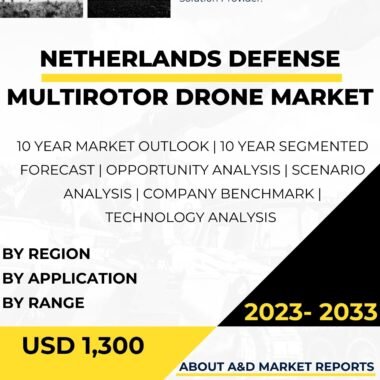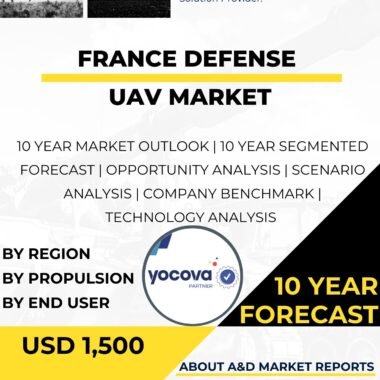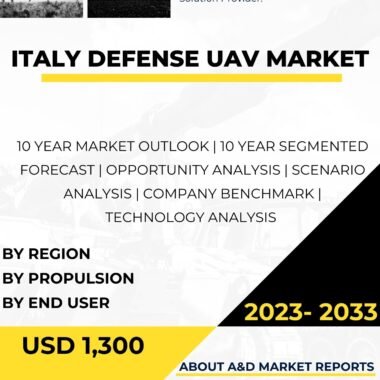Description
The Saudi Arabia Defense Unmanned Aerial Vehicle (UAV) Market is a crucial and rapidly growing segment within the country’s defense industry, focused on the procurement, development, and integration of unmanned aerial systems for military applications. Unmanned Aerial Vehicles, commonly known as drones, have become a game-changer in modern warfare, providing the Royal Saudi Armed Forces (RSAF) with enhanced situational awareness, intelligence gathering capabilities, and precision strike capabilities.
As a key player in the Middle East region, Saudi Arabia places significant emphasis on maintaining a modern and well-equipped defense force to safeguard its national security interests and contribute to regional stability. The RSAF has recognized the potential of UAVs in addressing emerging security challenges and supporting its various operational requirements.
The Saudi Arabia Defense UAV Market is characterized by a mix of international and domestic companies that specialize in UAV development and manufacturing. International defense companies, such as General Atomics, Northrop Grumman, and DJI, have a significant presence in the market and offer a wide range of advanced UAV solutions.
One of the primary drivers of the Saudi Arabia Defense UAV Market is the RSAF’s growing interest in unmanned systems and aerial capabilities. UAVs provide the military with unique advantages, including persistent surveillance, long-range reconnaissance, and the ability to access hard-to-reach areas. These capabilities are invaluable for intelligence, surveillance, and reconnaissance (ISR) missions, enabling real-time data collection and situational awareness.
Additionally, the use of UAVs for precision strike missions has become increasingly important for the RSAF. Armed drones can conduct targeted strikes against enemy positions with high accuracy, reducing the risk of collateral damage and minimizing the exposure of military personnel to hostile environments.
The Saudi government’s Vision 2030 economic diversification plan also influences the Defense UAV Market. As part of this vision, Saudi Arabia aims to develop a robust domestic defense industry capable of contributing significantly to the national economy. This includes fostering partnerships and joint ventures with international UAV companies for technology transfer and knowledge sharing.
Localization of UAV manufacturing aligns with the broader goal of reducing reliance on imports and creating high-skilled job opportunities for Saudi citizens. To achieve this, the Saudi government seeks to promote local research and development, training programs, and investments in UAV technology and infrastructure.
Moreover, the rapid technological advancements in the UAV industry have made drones more capable, reliable, and autonomous. The integration of advanced sensors, cameras, and communication systems enhances the UAVs’ operational capabilities, making them valuable assets for a wide range of military applications.
However, the Saudi Arabia Defense UAV Market also faces challenges. The widespread availability of commercial off-the-shelf (COTS) drones raises concerns about unauthorized UAV use and potential security risks. Safeguarding airspace and critical military installations from hostile drone activity requires robust counter-drone measures and regulations.
Additionally, ensuring the security and resilience of UAV communications and control systems is crucial. Protecting military drones from cyber threats and potential hacking attempts is essential to maintain operational control and prevent unauthorized access to sensitive data.
Furthermore, the effective integration of UAVs into the RSAF’s existing defense infrastructure demands careful planning and coordination. Ensuring interoperability with other military systems, data sharing, and collaboration between various branches of the military are essential for maximizing the UAVs’ utility and effectiveness.
In conclusion, the Saudi Arabia Defense UAV Market is a vital component of the country’s defense industry. As the RSAF continues to explore new technologies and capabilities to enhance its operational readiness and address emerging security challenges, the demand for UAVs is expected to grow.
International defense companies with expertise in UAV development and manufacturing will continue to play a significant role in this market. However, the Saudi government’s focus on economic diversification and indigenous defense industry development will drive increased collaboration and technology transfer initiatives.
By fostering local research and development, training programs, and investments in UAV technology and infrastructure, Saudi Arabia aims to build a robust and self-sufficient defense UAV sector, ensuring the RSAF remains operationally effective and prepared to meet future challenges. As the Kingdom seeks to maintain regional stability and safeguard its national interests, the Defense UAV Market will remain a critical area of focus within the broader defense modernization efforts.




